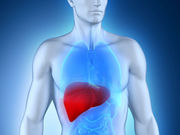Among obese patients, 16S rDNA concentration significantly higher for those with liver fibrosis
THURSDAY, Sept. 22, 2016 (HealthDay News) — In obese patients, changes in blood microbiota are associated with liver fibrosis, according to a study published online Sept. 17 in Hepatology.
Benjamin Lelouvier, Ph.D., from Vaiomer SAS in Labège, France, and colleagues examined the correlation between blood microbiota and liver fibrosis in European cohorts of patients with severe obesity. Data were analyzed for 50 Spanish patients in a discovery cohort and 71 Italian patients in a validation cohort. Blood bacterial DNA was analyzed quantitatively (16S rDNA quantitative polymerase chain reaction) and qualitatively (16S rDNA targeted metagenomics sequencing and functional metagenome prediction).
The researchers found that patients in the discovery cohort with liver fibrosis had significantly higher 16S rDNA concentration. Specific differences were identified in the proportion of several bacterial taxa in both blood and feces in16S sequencing; these correlated with the presence of liver fibrosis. In the discovery cohort there were also several secondary/primary bile acid ratios that were decreased with liver fibrosis. The correlation between blood 16S rDNA concentration and liver fibrosis was confirmed in the validation cohort, while the specific bacterial taxa signature was not confirmed, despite a similar trend in patients with more severe fibrosis.
“We have shown that changes in blood microbiota are associated with liver fibrosis in obese patients,” the authors write. “Blood microbiota analysis provides potential biomarkers for the detection of liver fibrosis in this population.”
Copyright © 2016 HealthDay. All rights reserved.








